Survey: Being a host or guest during COVID-19

Key takeaways
- 35.7% of people said seeing loved ones was worth the risk of someone contracting COVID-19
- 66% of people felt at least some pressure to attend recent social gatherings
- 40% of people have argued with loved ones about virus precautions for holiday gatherings
Exploring how people feel about socializing during COVID-19
Beginning in early 2020, the COVID-19 pandemic threw many aspects of everyday life for a loop. People around the world were forced to rethink nearly every part of normal life: work, school and even how to buy groceries.
With the Centers for Disease Control and Prevention (CDC) advising people to limit trips out of their homes, many people found their social life shutting down. Gone were the days of catching up over coffee or grabbing lunch with a co-worker. And while people have been forced to adapt for months now, socializing can still feel fraught with uncertainties.
We surveyed over 1,000 people about their feelings on socializing during COVID-19. We asked about people’s comfort with socializing right now, and what kinds of social practices have had to fall by the wayside in an effort to stop the spread of the virus. We also delved into people’s plans for gathering during the upcoming holiday season. Read on to see what people had to say.
Sentiment on socializing
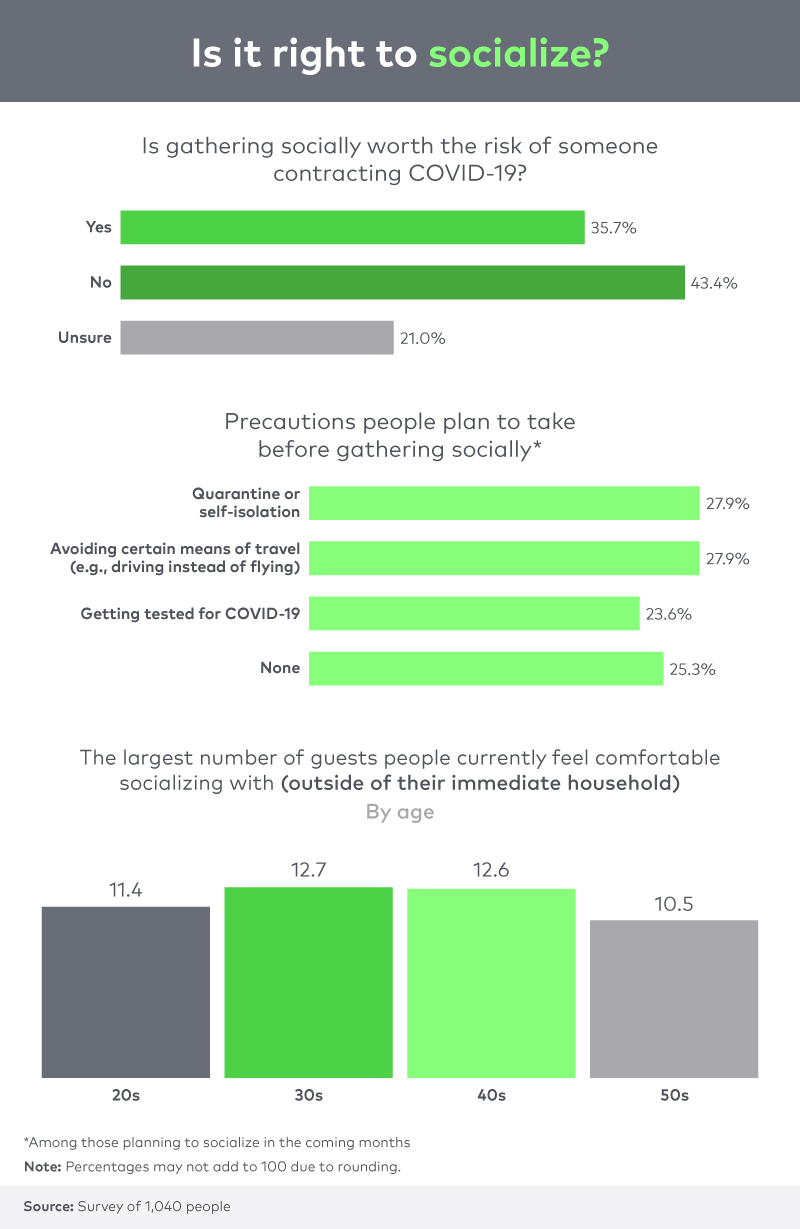
While the CDC and others have offered best practices for everyone to follow during the pandemic – wash your hands, keep your distance and wear your mask – not all places have specific rules dictating how social gatherings should be conducted, if at all. This has forced many people to assess risk on their own on a case-by-case basis and decide for themselves what additional precautions to take.
Over a third of the people surveyed said they believe socializing is worth the risk of someone contracting COVID-19. After months of limited contact with loved ones, it’s understandable that some might be eager to see loved ones. There have been concerns throughout the pandemic about the effects of isolation and loneliness on specific populations, particularly the elderly.
Nearly 28% of people planning to gather with others in the coming months said they would self-isolate ahead of socializing, and 28% also said they’d avoid particular means of traveling in preparation. However, 1 in 4 people planning to socialize said they wouldn’t be taking any of the precautions we asked about.
A lot of emphasis has been placed on the size of gatherings during the pandemic. Adding more people can often mean adding more risk for virus exposure. When asked what the largest number of people outside their immediate household respondents would feel comfortable gathering with, the average was above 10 for all age groups, with people in their 30s and 40s willing to gather with the most people (12.7 and 12.6, respectively).
Difficult conversations around social gatherings
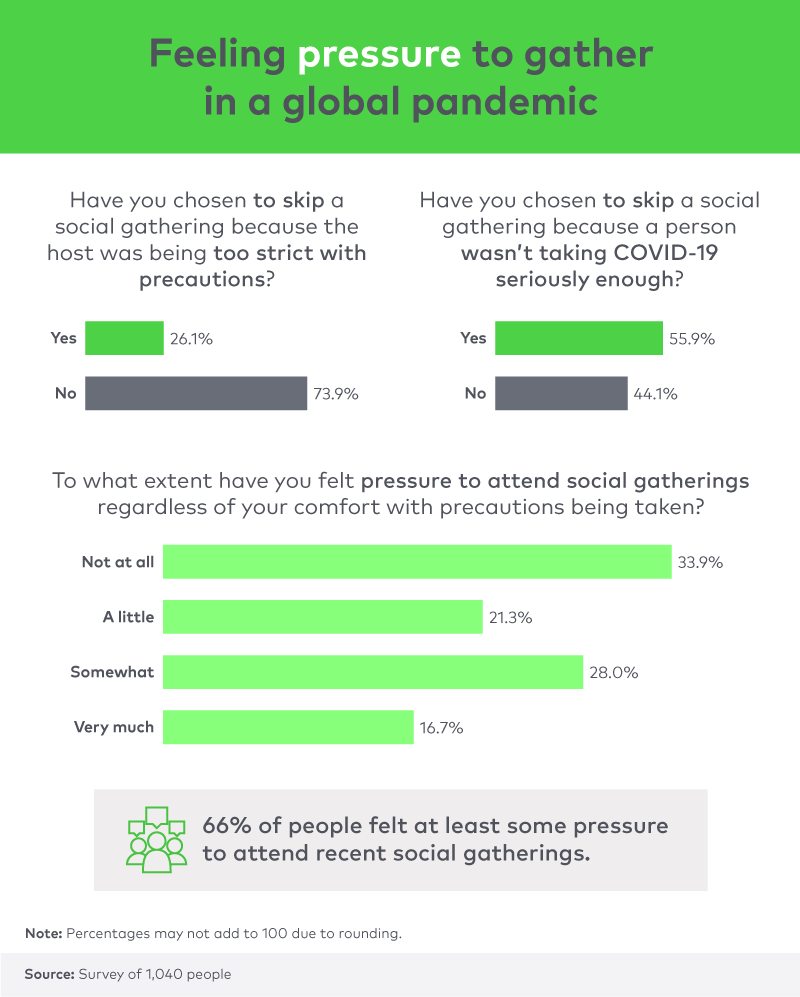
Although 33.9% of people said they didn’t feel any pressure to attend social gatherings right now, 66% of people admitted to feeling at least some pressure around socializing, regardless of their comfort with the precautions being taken.
With the risks the coronavirus brings, many people have had tough conversations with family members and friends about the amount of risk they’re willing to confront in order to socialize. Nearly 56% of the people surveyed said they had chosen not to attend a social gathering because someone they know wasn’t taking the virus seriously enough. Conversely, though, 26.1% said they’d chosen not to attend a gathering because they believed the host was being too strict with COVID-19 precautions. This further emphasizes the variety of opinions people have on what is safe and appropriate under current circumstances.
Laying out the rules
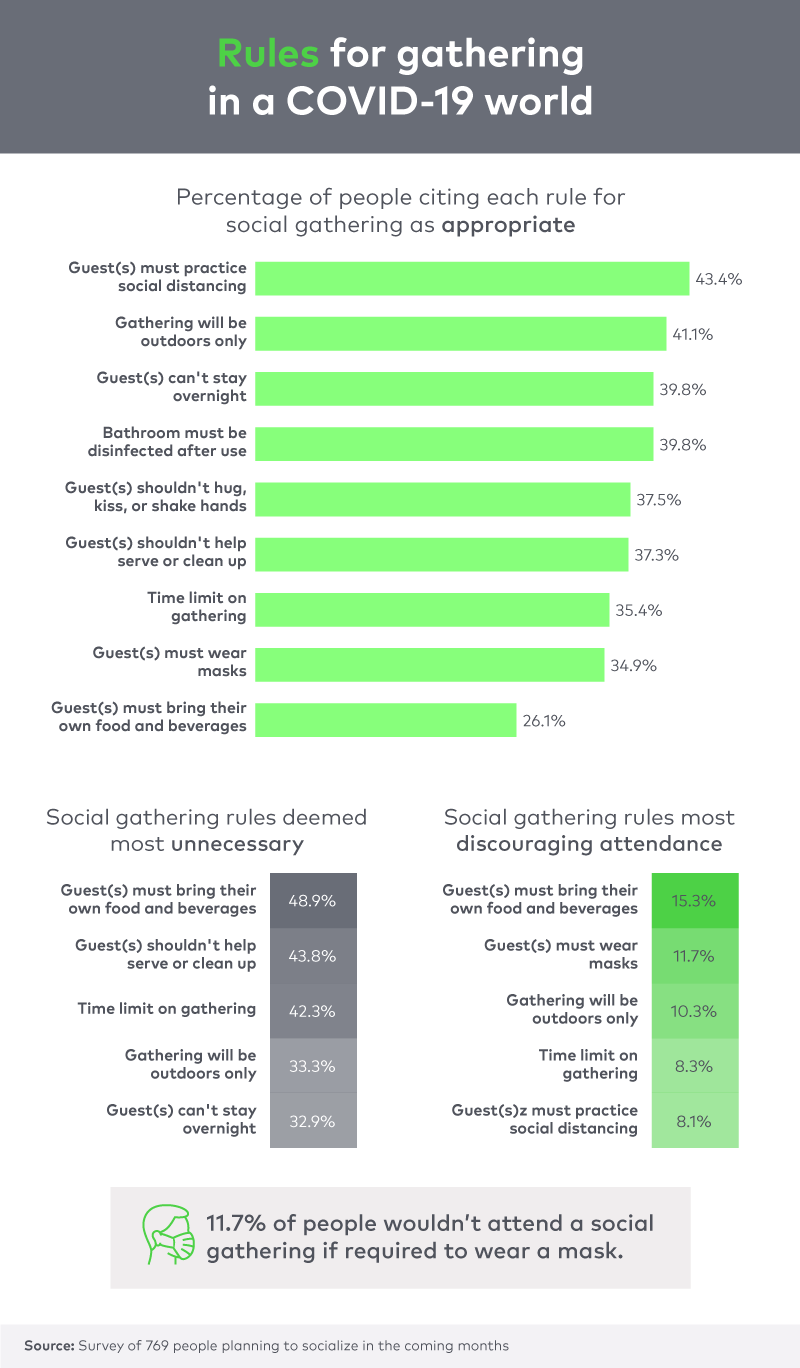
With people having to navigate the tricky situations COVID-19 has created, we were curious about the lines people were drawing and what precautions people felt were unnecessary.
Just over 43% of people who were planning to socialize in the coming months found asking guests to practice social distancing during gatherings appropriate – the most agreed-upon rule. Additionally, 41% of people said it was a good idea to only have social gatherings outdoors. COVID-19 doesn’t spread as easily outside, compared to enclosed indoor spaces. However, given that winter is quickly setting in, the feasibility of completely outdoor gatherings might be tough for those in colder climates.
When it came to rules people thought were unnecessary, a plurality believed asking guests to bring their own food (48.9%) or to not help serve and clean up (43.8%) was overkill. Additionally, 11.7% of people planning to socialize said being asked to wear a mask at a gathering would discourage them from attending.
The holiday season and COVID-19
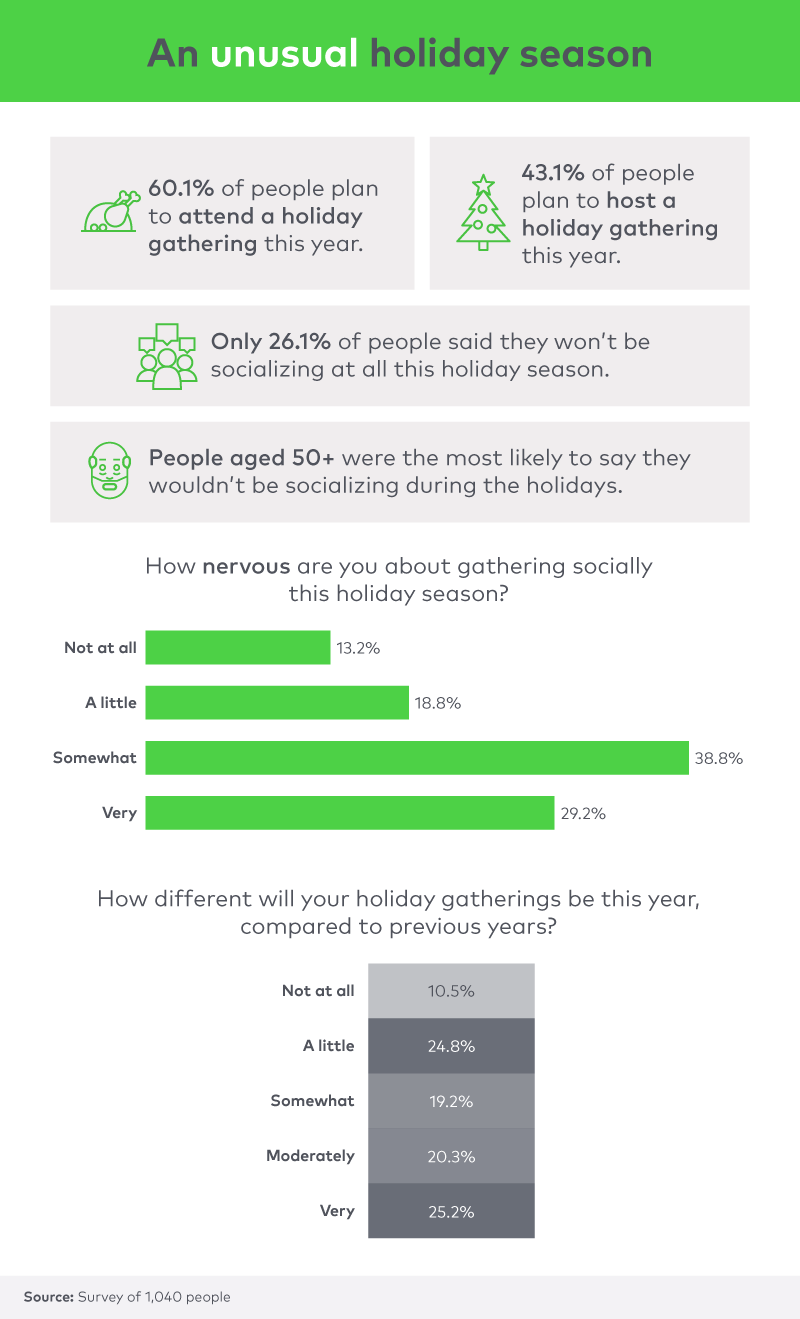
2020 has been an unusual year, and the holiday season will be no different. Between changed plans and abandoned traditions, the 2020 holidays will likely be a departure from years past.
Respondents to our survey seemed to confirm this. Nearly 90% said their holiday gatherings will at least be a bit different from previous years, with 25% saying they will be very different.
Anxiety also appeared to be running high. Nearly 3 in 10 people were very nervous about gathering with loved ones this year. Only about 13% expressed no worry at all. The pandemic has been hard on the mental health and stress levels of many, so it’s not entirely surprising that the holidays are exacerbating anxiety this year.
However, many appeared to be forging ahead with social gatherings. Sixty percent of people said they would be attending a holiday gathering as a guest, and 43.1% said they would be hosting their own gathering. Regardless of whether you’re hosting or coming as a guest, though, there are simple precautions you can take to help maintain the merriment.
Holiday compromises due to COVID-19
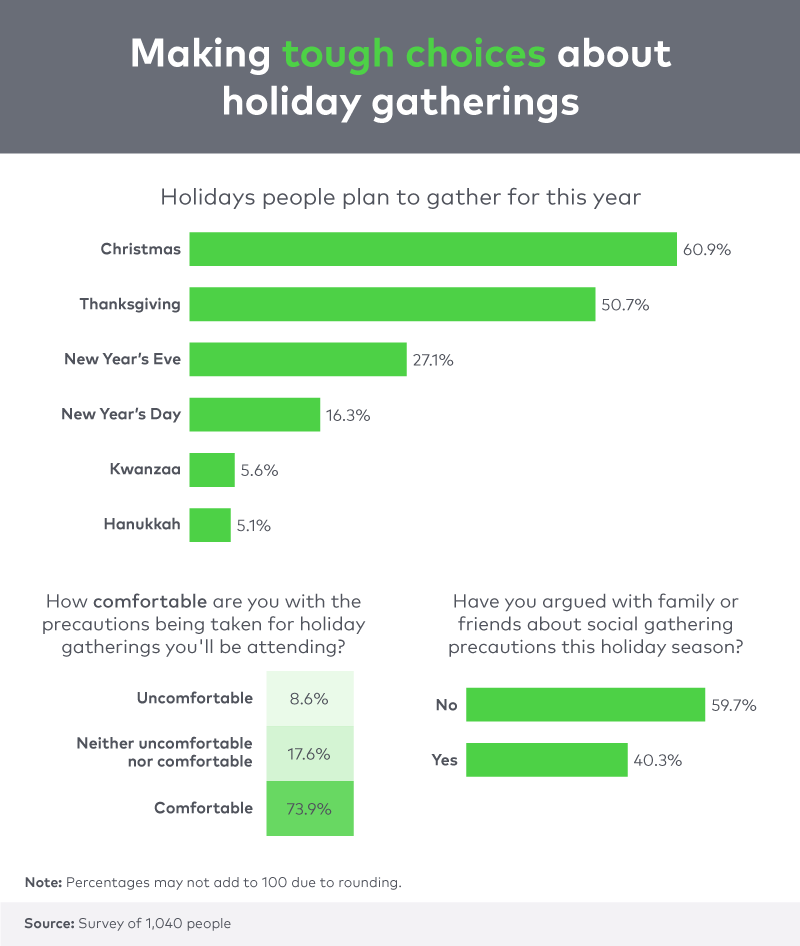
A majority of those surveyed (60.9%) said they intend to see loved ones for Christmas this year, and 50.7% said they would gather for Thanksgiving. However, the difference in those percentages could signal that people are compromising on the number of gatherings they have or attend this year to be safe.
Despite any nerves they had, 73.9% of people planning to gather felt comfortable with the precautions they had in place. However, it seemed that not all families and friends were on the same page: 40% reported arguing with loved ones about virus precautions for holiday gatherings.
Socializing safely
The COVID-19 pandemic has given people a lot of things to be concerned about, especially when it comes to socializing. Varying opinions on appropriate precautions to take and anxiety around infection have made gathering together a lot more tense than it used to be. However, a majority of people said they still intended to see loved ones, particularly as the holidays draw near. Plus, many people reported taking a variety of precautions and agreed on the appropriateness of rules like social distancing and keeping gatherings outdoors when possible.
One thing you shouldn’t have to worry about this winter is the functioning of your home appliances. After taking added precautions around the coronavirus to see your loved ones, the last thing you want is your oven breaking before holiday dinner. That is where Cinch Home Services can help. Our home warranties can ensure that you’re covered when mishaps occur. Visit cinchhomeservices.com to learn more.
Methodology
We surveyed 1,040 people about their feelings on socializing right now, particularly as the 2020 holiday season approaches.
Respondents were 53.7% women, 46% men, and 0.4% nonbinary. The average age of respondents was 37.7 with a standard deviation of 12.2. Respondents were asked to report the highest number of people they’d currently be willing to socialize with outside their household. The average was calculated to exclude outliers. This was done by finding the initial average and standard deviation and multiplying the latter by three. This was then added to the initial average. Any data point above that sum was then excluded from the final calculation.
Data about steps people plan to take prior to social gatherings were based on responses solely from people who reported that they were planning to attend or host an upcoming gathering (769 respondents).
Respondents planning to attend or host upcoming social gatherings were asked about their sentiment on different rules and precautions people may be considering for gatherings this year. They were asked to select from the following options:
- This is necessary for me to attend a gathering.
- This is an appropriate rule/precaution.
- This is unnecessary, but I would still attend.
- I would not attend if this rule/precaution were in place.
Data about what holidays people plan to gather for this year were compiled through a check-all-that-apply question. Therefore, percentages won’t add to 100.
Limitations
The data we are presenting rely on self-report. There are many issues with self-reported data. These issues include, but are not limited to, the following: selective memory, telescoping, attribution and exaggeration.
Fair use statement
COVID-19 has made decisions about socializing much more difficult. If someone you know would benefit from the information in this project, you are able to share for any noncommercial use. Please link back here so the entire project and its methodology can be reviewed. This also gives credit to our hardworking contributors, without whom this work wouldn’t be possible.



